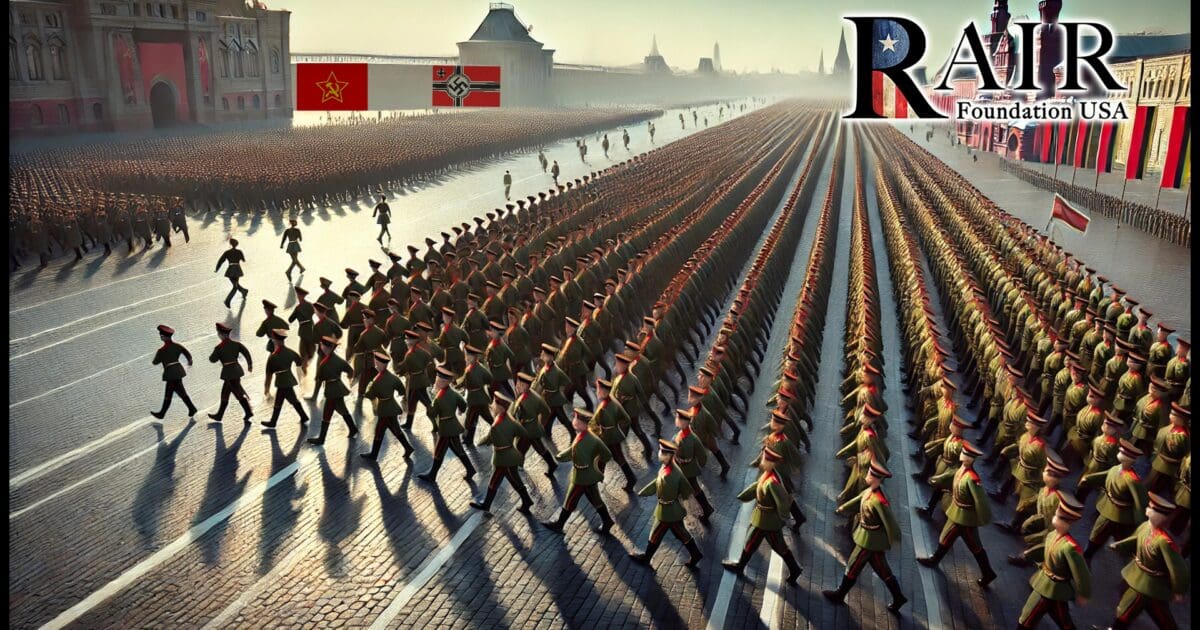It has become a widespread tactic of the far left, particularly groups like ANTIFA, to accuse anyone who opposes their agenda or challenges the far-left and communist-inspired policies being pushed across the Western world of being a ‘Nazi’ or a ‘fascist.’ This accusation is not only misleading but serves to stifle opposition and silence those who resist their ideological control.
To understand the nature of this slander, we have to take a short journey through history and establish some operational definitions of terms. In other words, we need clear definitions that we can both understand and move forward with that understanding.
Adding to the Nazi slander, one of the most irritating untruths of the last century post-WWII is the idea that left or right, when extreme enough, becomes the same thing. That somehow, the left wing and right wing form a circle or are somehow the same at the tips. Let’s put that right to rest.
Left-wing means collectivist. In modern times, it comes from Karl Marx, although the roots of this kind of thinking can go right back to Plato.
Leftism means the individual does not exist.
That all must be sacrificed for the state that an individual life means nothing. That the state has god-like powers, not just over life and death of the people, but over reality itself.
“And the state will be unto like a God that bestrides the land.” – Hegel.
The state will determine what is true, and the people must believe it.
“The party told you to reject the evidence of your eyes and ears. It was their final, most essential command.” – George Orwell, 1984.
In the film 1984, the book written by George Orwell and the film version directed by Michael Radford, there is a scene near the end in which Winston Smith is being tortured until he can actually believe that when he is shown four fingers by a member of The Party, he actually believes it is five because the party said it was five. The torture won’t stop unless and until he actually sees five fingers because he was told there are five fingers.
This is the essence of communism.
For the sake of argument, one might look at the Trans-Gender issue in this light. Should a person, hypothetically speaking, notice that men are men, and women are women and refuse to accept the state’s position that they can be whatever they say they are in a communist state, that person would find himself arrested and be a bona-fide thought criminal.
Reality itself becomes illegal. And this was equally true of the Nazis. If you contradicted an edict of the Nazi party, you would pay a hefty price.
In a right-wing state, the free exchange of ideas takes place. The theory or model of reality that most closely resembles the truth tends to become the dominant belief until a better representation of reality appears. We call this process “science.”
In Nazi Germany and communist states, sciences are created to prove what the state edicts say is true. In Nazi Germany, the invention of Phrenology, or reading the bumps on a person’s head, was established in order to prove the inferiority or superiority of a given race. In the Soviet Union, evolution was considered capitalist in nature and illegal. Instead, they invented their own biological sciences that had to prove the state’s beliefs on biology and evolutio
We call this Scientism. One example of this was Lysenkoism.
BREAKING:
— Visegrád 24 (@visegrad24) September 2, 2024
The teacher Enoch Burke has been arrested at Wilson’s Hospital School in Ireland after returning the school from where he was unjustly fired for refusing to use the desired pronouns of a student considering himself transgender
🇮🇪 pic.twitter.com/zfW4hTOPuD
Describing the thought process of leftism is an enormous job. Still, for the sake of this article, the fact that it is collectivist, authoritarian, and all things are centrally planned is enough. Also, Karl Marx is, at least on the most superficial level, the progenitor of leftist lines of effort against Western civilization. The weaponizer of Leftist thought against classical civilization—in other words, all of us.
Right-wing means that the individual is paramount, that people, as individuals, have rights, and that the job of the state is to preserve those rights and adjudicate when those rights are breached or in conflict with each other from time to time.
The right to private property is right-wing and anathema to the left.
When Hitler took over Germany, he had his henchmen take over every factory and business, even formerly private clubs and sports organizations, all of which became National Socialist Bowling clubs or flying academies or whatever they had been.
In a left-wing society, all that is not expressly permitted is forbidden. In a free society, all that is not expressly forbidden is allowed.
In the West, a thief is a criminal. But if one examines how theft as an act is being treated in leftist states like California and Oregon, we can see a fundamental shift in the entire concept of property rights, even if the language used disguises that intent. An emphasis on class struggle tends to be used to justify leftist theft policies rather than the more honest intent for the dissolution of private property rights.
The right to freedom of expression is also right-wing. In fact, the U.S. Constitution and Bill of Rights are perhaps the best-codified set of instructions for running a country for the individuals who live there.
Hitler’s policies on speech critical of his National Socialist state and Nazi ideology are well known and firmly in the camp of the left.
Extreme right-wing would be libertarian. Extreme left-wing would be communism. There is no crossover there.
Now, let’s add to this the often-overlooked historical facts. Joseph Goebbels, one of Hitler’s closest allies, himself declared in 1931 that the Nazis were ‘the German left’ and despised the ‘right-wing national bourgeois bloc.’ This is not some modern-day attempt to rewrite history; it comes straight from the Nazi leadership itself. Goebbels made it clear in several statements that the Nazi ideology was deeply rooted in socialism:
“We are not a charitable institution but a Party of revolutionary socialists.” – Der Angriff editorial, May 27, 1929
“Socialism is the ideology of the future.” – Letter to Ernst Graf zu Reventlow as quoted in Goebbels: A Biography
“The bourgeoisie has to yield to the working class … Whatever is about to fall should be pushed. We are all soldiers of the revolution. We want the workers’ victory over filthy lucre. That is socialism.” – Doctor Goebbels: His Life and Death
“We are socialists, because we see in socialism, that means, in the fateful dependence of all folk comrades upon each other, the sole possibility for the preservation of our racial genetics and thus the re-conquest of our political freedom and for the rejuvenation of the German state.” – Why We Are Socialists? Der Angriff (The Attack), July 16, 1928
These quotes further illustrate how deeply embedded socialist principles were in the Nazi Party, contrary to the modern portrayal of them as right-wing. Despite these facts, anyone who dares to voice the truth that the Nazis were left-wing faces significant backlash today. Austrian journalist Anna Dobler lost her job for simply expressing this view.
The Nazis were not just socialists in name; their policies were rooted in anti-capitalism and anti-Semitism, ideas closely tied to leftist doctrines. Their socialist rhetoric went hand in hand with a hatred for capitalism, much like the Bolshevik Soviet Union.
As Irish historian Brendan Simms noted, Hitler’s anti-Semitism was deeply tied to his hatred of Anglo-American capitalism, drawing from the same well of leftist anti-capitalist thought that Marx and the Soviet Union had drawn from.
National Socialism’s economic policies were hardly the free market many associate with the right. Instead, state intervention was ubiquitous, with the Nazi regime directly controlling production processes through mechanisms like the Reichswerke Hermann Göring. This is strikingly similar to today’s state capitalism in China, where private ownership exists but only under the tight control of the state. Nazi Germany’s economy, much like in communist states, was a centrally planned machine, not a liberal market economy.
Even renowned historian Sebastian Haffner argued that Hitler’s real enemies came from the right—aristocrats and conservative elites—who resisted his revolutionary collectivism. Haffner even placed Hitler closer to Stalin than Mussolini, insisting that calling Hitler a fascist was misleading. Fascism in Italy was right-wing, but Hitler’s National Socialism was a revolutionary left-wing movement at its core.
Furthermore, there were no death camps in Italy, and over 100,000 Jewish members were part of Mussolini’s Fascist party. National Socialism was, in fact, a synthesis of Soviet Communism and Italian Fascism, designed to push Nazism further left, even beyond the Soviets.
The Nazis didn’t just hate Jews based on racial ideology; they viewed Jews as enemies of the state in both national and socialist terms, much like the Soviet Union’s own persecution of Jews.
In conclusion, Stalinist historical distortion has allowed modern narratives to wrongfully categorize the Nazis as right-wing. The tactic of labeling fascism as ‘capitalism in crisis’ was a deliberate effort to distance the left from the horrors of National Socialism. But make no mistake—the Nazis were a left-wing, collectivist, anti-capitalist, authoritarian regime. They shared far more with Stalin’s communists than they ever did with any form of right-wing ideology.
The facts are undeniable: National Socialism and Communism are two versions of the same ideology. The right champions the individual, while the left sacrifices the individual to the state. There is no “meeting in the middle.”
Additional Sources
An excellent film that highlights the true nature of leftism is The Soviet Story.
For a more in-depth exploration of the socialism and socialist philosophy behind Hitler’s National Socialism, Tik History offers extensive coverage in several videos on YouTube, including one that directly addresses this claim with supporting source materials.
Hitler’s Brownshirts battled ANTIFA in the streets and emerged victorious. Afterward, many ANTIFA members switched sides, joining the Nazis in their fight against the actual right wing, which opposed the concept of an all-powerful state.
For more details, refer to chapters 4 and 5 of Postmodernism Explained by Stephen Hicks.














Great topic, and thank you for moving this along!
One significant correction to look into however, fascism was not right wing either. Mussolini himself said fascism and “the right” was the future, but he was speaking in the context of early 20th century European socialism, and also said fascism was to the left of democracies.
Good quote, one of many from Mussolini, Gentile, and other former Italian Socialist Party members who broke away to form Fascism:
“Our programs are definitely equal to our revolutionary ideas and they belong to what in democratic regime is called “left”; our institutions are a direct result of our programs and our ideal is the Labor State. In this case there can be no doubt: we are the working class in struggle for life and death, against capitalism. We are the revolutionaries in search of a new order. If this is so, to invoke help from the bourgeoisie by waving the red peril is an absurdity. The real scarecrow, the real danger, the threat against which we fight relentlessly, comes from the right. It is not at all in our interest to have the capitalist bourgeoisie as an ally against the threat of the red peril, even at best it would be an unfaithful ally, which is trying to make us serve its ends, as it has done more than once with some success. I will spare words as it is totally superfluous. In fact, it is harmful, because it makes us confuse the types of genuine revolutionaries of whatever hue, with the man of reaction who sometimes uses our very language.”
Mussolini
You are correct as I understand it, and I thought I had written that in to the article with the analogy of the narrow triangle.
Fascism was only right relative to Soviet communism. But both saw their enemy as a society built on the individual.
A Question of Balance
Thanks for sharing that, an excellent essay from the perspective of left and right. My own philosophy approaches the issue from a different perspective. I do not believe in ‘left’ and ‘right’ per se, though in the context in which you write they make perfect sense. That is why I tend to put them in inverted commas.
Rather, my approach relates to the concept of balance. It is based on what could be called ‘the centre ground’ but in reality is far more than that. It can to be understood in within the eastern concept of yin and yang and Sun Tzu’s idea of going with the flow and adjusting when required to maintain equilibrium and therefore strength and endurance.
At the moment, Western Civilisation is completely out of balance. The pendulum has swung so far one way that the entire system is on the verge of collapse. In your model it would be a case of explaining that it has swung much too far to the ‘left’. In my world view it has lost its equilibrium and the system will soon collapse because of that. I believe that this lack of balance has actually been artificially generated for political purposes in order to deliberately bring down the existing system and replace it with something completely different.
You might argue that individualism is good and collectivism is bad. I would argue that both are good and bad at the same time. They are effectively both the same thing in that they occupy a single continuum. At the moment, individualism has been all but abandoned and collectivism prevails. To have one or the other in a pure form, as the raison d’être of the state, is disastrous for human happiness and is very dangerous in terms of political stability. It is therefore necessary to restore the balance.
In our current socio-political milieu, politics moves very slowly, otherwise any change is deemed ‘extreme’ by those that control the system. Delaying tactics are used so that those currently in power are able to redeploy their resources and thus maintain their power and position of dominance. The bad parts of the system remain in place, ready to regrow and destabilise things anew.
We saw this at the end of the colonial period when, in power terms, nothing really changed and places like Africa and India remained permanently poor and still beholden to the same power brokers. It continues to this very day with the predominance of Davos Globalism as the ruling group at the top of the new imperial hierarchy.
The way I see things, if the pendulum has swung to an extreme position, the response has to be equally extreme in order to restore balance as quickly as possible so that stability is restored and the causes of the instability are removed. In this way those that have abused the system are punished and permanently lose their position of dominance. There is no prospect of them maintaining their positions and waiting to have another bid for power after they have licked their wounds and restored their resources. During the Banking Crisis, we saw how the public purse bailed out those who had brought the system out of balance for personal gain. It was the worst mistake to make because it preserved the instability.
Those that have brought Western Civilisation to its current crisis should not, once politically outmanoeuvred and defeated, be given time to recover like the bankers or the colonialists did. Equilibrium must be restored both in fact and in terms of its long term resilience. Long term stability and peace is our collective birthright. Those who seek to cause instability for personal gain must be opposed by any morally constituted and just political system.